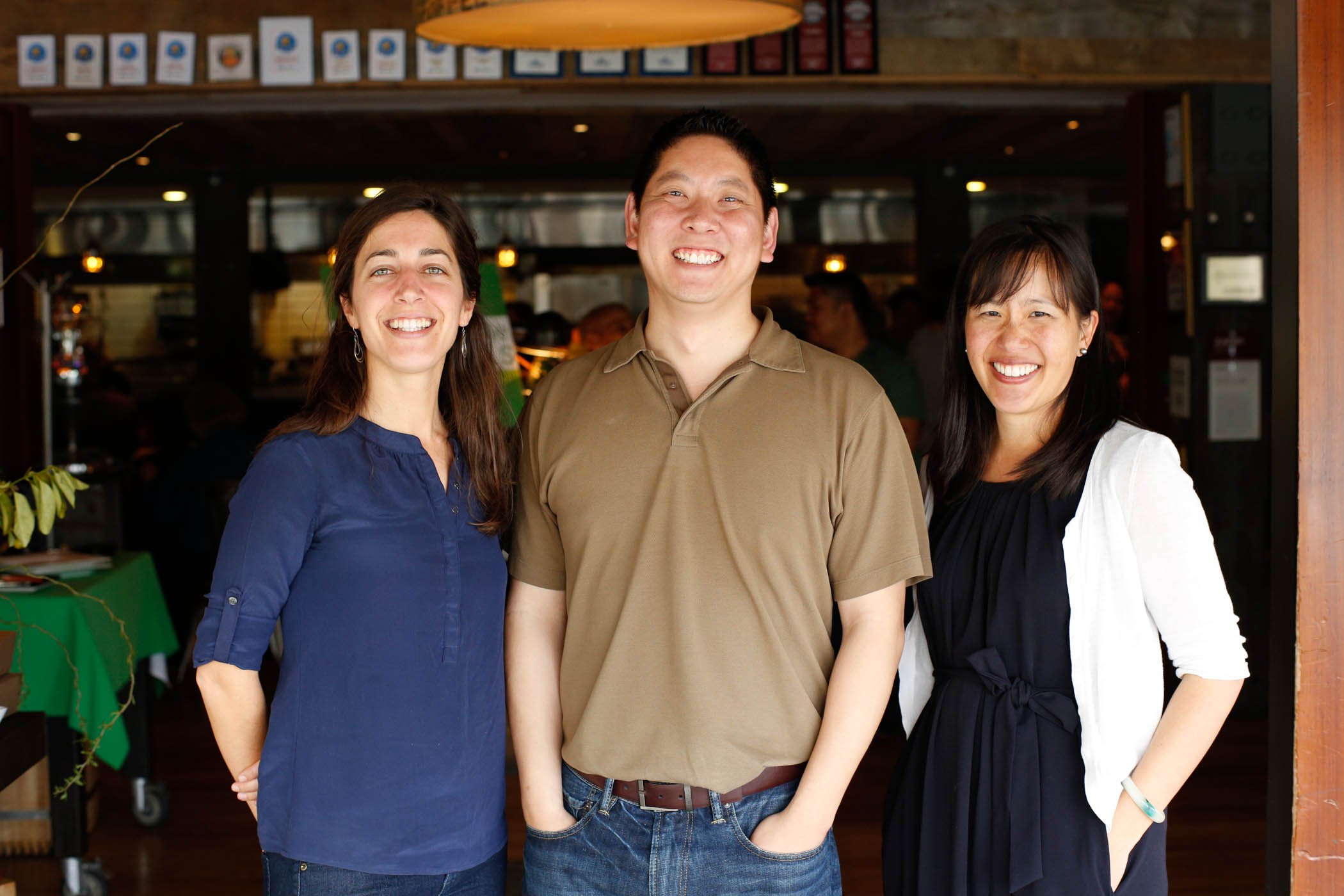Farmers Aren’t Rockstars
September 21st, 2023
[Read time: 7 minutes]
This piece was written by North Bay Director, Paige Phinney.
Paige has been a part of KTA since its founding in 2013, both witnessing and contributing to the growth of our programs and organization.
As KTA marks its 10th Anniversary this year, Paige shares her reflections and insights from her 20 years of directly supporting small farmers and ranchers as well as advocating within the agricultural space. To hear more from Paige, join us for our 10th Anniversary Celebration on September 28th in Berkeley.
Paige, KTA Founding Executive Director Anthony Chang, and Director of Resource Generation Pei-Yee Woo
A Decade of Learnings
Kitchen Table Advisors is celebrating ten years of existence, a decade that has coincided with a global pandemic and a shifting climate. During this time, our food culture has shifted; I watched farmer-owned CSAs dwindle, farm-to-table restaurants struggle and fold, and the emergence of tech companies in the meal/food delivery industry. Amid the struggles of COVID, though, we witnessed the blossoming of a local food culture in our communities and inside our homes. Social distancing and quarantine drove us to farmers markets, we explored food through local CSAs, and ventured into culinary experiments, unveiling a potential economic lifeline for small farmers.
Our small, local farming communities are a natural touchstone for our shared humanity. The value they provide us is obvious and profound at the same time: food and culture mixed with connection to this beautiful planet and to each other. It is natural for people to turn to our farmers when we experience uncertainty – the work they do is essential. But despite their centrality, the business of farming is a tough one.
On average, when we start working with our clients, their take home pay per business owner is about $21,000. Over the course of our three-year advising program, our clients generally double their income, which is an amazing feat. However, for many, their business is still tenuous and they remain well below the median income level for their region despite this improvement.
So, the question endures: why is it so hard to make a living as a farmer when their value is so innate? Knowing that these are just a few thoughts around the many nuances of this struggle, I ask for your grace as I explore this question more here as well as continue learning over time and may change my mind.
Is it our economic system?
Yes.
Agricultural small business owners need to wear so many hats; they have to be specialists in marketing, food safety, production, human resources, finance, and more. Additionally, farming needs time, land, and infrastructure — three things that cost a lot of money that farmers and ranchers might not have access to – particularly for those who are committed to sustainable, regenerative practices, and taking care of their employees with a living wage. All of these challenges and barriers are compounded for a business owner facing systemic discrimination and oppression.
Our current economic structure tells business owners to sell more, reduce their costs, and increase their profit margins. In farming, the only real margins that one can shave often come at the price of producers’ values, sacrificing how they interact with the soil, pay their employees, or treat their product. Despite having to operate within this structure and follow its rules, the intrinsic value of real food exists outside of any economic system, a fundamental necessity that is currently not valued as such by our economy.
Maybe they just need better marketing? Maybe, maybe not.
One way farmers can increase their profit within the current economic system is through marketing and selling a “premium” product – one that often comes with more waste in the field, higher labor costs, and a greater amount of time and resources spent on marketing. In order to glean this premium, farmers can be compelled to sell themselves and their narratives as a product. However, these narratives often only tell one side of their reality, which can lead to misunderstandings or perpetuate their own impostor syndrome.
I once held the belief that branding farmers as “rockstars” could solve their challenges, helping to bring better returns to their businesses with the right font and image. I thought that if everyone knew their farmer and, with great fandom, worshiped their talents, then they would of course be willing to pay more for their product and seek it out wherever they could. But, I have seen that this simply isn’t the case. While it can help in some ways to be widely known in the community, the prospect of a comfortable livelihood as a small farmer or rancher remains daunting. The market will only pay so much for raw products, and prices of produce and meats seldom keep pace with inflation. I recall a farmer wondering: how much would someone really be willing to pay for one bunch of beets?
Do we, as a society, think that a professional farmer should only make so much money?
Perhaps — maybe even unconsciously.
Another possibility I want to pose: do we, as a society, oversimplify farming, romanticizing it not as hard physical labor, but a life full of sunflowers and farm animals and bustling farmers markets with kids and music, etc? Perhaps it is perceived as a hobby, something to be enjoyed, something to do in retirement. Up close and personal, the reality is that farming is far from simple. A rotating multi-crop plan is almost impossible to put into a spreadsheet. Getting a fresh product to market at its optimal freshness and peak ripeness is a feat in and of itself. The crucible of the harvest season is a test of endurance and perseverance. As a business owner investing time and money over a year, watching a crop be lost to weeds, sun damage, size, ripeness, or lack of harvest labor means a loss of income. Crops and animals are subject to environmental changes too; drought, flood, fire, smoke, simply too much heat or rain too late in the season, or nights that are too cool can shave profit margins overnight. For a farmer who has scarce resources, taking a sick day or staying inside because of smoke is practically off the table.
What about the ethical duty to ensure everyone has access to food?
True — and, yet, subsidies are complex.
It is our ethical duty as a society to make sure that people have access to nourishing food. Subsidies and ethical duty intertwine in agriculture. I have had countless conversations with farmers who are grateful to be able to sell at farmers markets and earn top dollar for their beautiful and unique products; however, at the same time, they feel torn by the fact that their products are not financially accessible to everyone. As I discussed above, some business owners have no other choice than to market their farm and products to people and entities who can afford to pay their prices.
On some level, there is a sense that food should be cheap, only taking up a percentage of income for a family and fulfilling an American promise of food accessibility. In the U.S., the price of food is depressed via an infusion of government funds and resources – largely surrounding commodity crops (such as grains and sugar) – which are specifically aimed at changing the marketplace. But, as Michael Pollan aptly points out, to live a healthy lifestyle as a human being, we need to eat unprocessed food, mostly plants. The resources that currently exist to support growers of this “real food” take the form of marketing, education, and research, with support around mitigating risk or reducing costs for farmers glaringly absent.
Our Ultimate Vision
Paige and KTA client Joanna Letz of Bluma Farm
Kitchen Table Advisors works with a diverse array of farmers from all different backgrounds and varying access to resources. For some, it is the brightest opportunity for them to determine their own economic freedom; for others, it is a vision for the future, a commitment made post higher education. For all of our clients, farming is not just a job – it is a vocation, a leap of faith, rooted in values. I am inspired by their conviction and courage.
Our ultimate vision at KTA is that regenerative farmers and ranchers are thriving leaders of a vibrant community-based economy rooted in an equitable distribution of power and resources. In reality, they are already leaders – they already are knowledge keepers and frontline climate adapters. When we need light in the darkness, they are our current superheroes, without saying a word or taking a photograph or enduring physical hardship. Now, it is time for society to come together, directing our own creativity, skills, and drive toward reciprocating the gifts of nourishment and community they offer with a thriving livelihood.
And we have begun to see some glimmers of hope. During the pandemic, local philanthropists, food access organizations, and the USDA bridged the consistent gap between local food and people who need access to food – healthy food at a price that the farmer set, directly to a community that the farmer knew. It was a beautiful display. While many of those resources have pivoted away now, they signal future learning opportunities for our food system.
Multi-generational work is needed to bring us from our current state to our ultimate vision. We have work to do to bring ourselves and our system back to the ground, to be community-based, to re-assign value outside of any economic system. This type of economic structural change requires collective reimagining. While there is no perfect solution, we at Kitchen Table Advisors are starting with one farmer at a time, helping to improve their access to patient and affordable capital, land that is long-term and secure, and markets that are committed to them. In all cases, we aim to advocate for and support efforts that empower these farmers and ranchers and recognize the true value of their service.
This is our messy yet vital journey, and we cannot do it alone – this re-envisioning of our food system requires a collective societal will. If you haven’t already, join us in our vision. With renewed hope, I welcome the fall equinox and the shifting of the season.
PC: Kelsey Joy Photography, Nicola Parisi, Katelyn Tucker Photography





